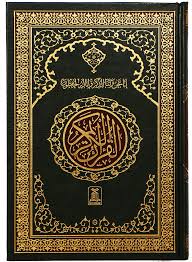Us Muslims blame America
Don't tell the world you are a peaceful organization when your own manifesto states that others are to be killed and those who even question the myth of HELL* should have their faces disfigured and their limbs cut off...
The Quran contains over 100 passages that call Muslims to take up arms against unbelievers in the name of Allah.
“Kill them [unbelievers] wherever you find them… And fight them until there is no more unbelief and worship is for Allah alone” (Quran 2:191-193).
“Strike off their heads and strike from them every fingertip” (Quran 8:12).
“Allah has purchased from the believers their lives and their properties; in exchange for that they will have Paradise. They fight in the cause of Allah, so they slay and are slain” (Quran 9:111).
“Truly Allah loves those who fight in His cause in battle array…” (Quran 61:4)
“The Messenger of Allah said: I have been commanded to fight against people till they testify that there is no god but Allah, and that Muhammad is the messenger of Allah” (Sahih Muslim 1:33).
The word translated “fight” in many of the verses above is the infamous word jihad, which loosely means “struggle.” And while it’s true that “jihad” can sometimes refer to the “inner struggle” of a faithful Muslim against sin, it’s plain that an “inner struggle” is not the meaning of passages that call for the removing of heads and fingers from every infidel. Indeed, virtually every major Muslim jurist (specialists of Islamic law) have for centuries understood that jihad was an inherently militaristic term.
"To be God fearing is good for each man, while organised religion damns all." Abraham Ben Judea
Durante di Alighiero degli Alighieri (Italian: [duˈrante deʎʎ aliˈɡjɛːri]; Latin: Dantes), commonly known by his name of art Dante Alighieri or simply as Dante (Italian: [ˈdante]; English: /ˈdɑːnteɪ/, UK also /ˈdænti,
In the late Middle Ages, most poetry was written in Latin, making it accessible only to the most educated readers. In De vulgari eloquentia (On Eloquence in the Vernacular), however, Dante defended the use of the vernacular in literature. He would even write in the Tuscan dialect for works such as The New Life (1295) and the Divine Comedy; this highly unorthodox choice set a precedent that important later Italian writers such as Petrarch and Boccaccio would follow.
Dante was instrumental in establishing the literature of Italy, and his depictions of Hell, Purgatory and Heaven provided inspiration for the larger body of Western art.[3][4] He is cited as an influence on John Milton, Geoffrey Chaucer and Alfred Tennyson, among many others. In addition, the first use of the interlocking three-line rhyme scheme, or the terza rima, is attributed to him. In Italy, he is often referred to as il Sommo Poeta ("the Supreme Poet") and il Poeta; he, Petrarch, and Boccaccio are also called "the three fountains" or "the three crowns".


Comments
Post a Comment